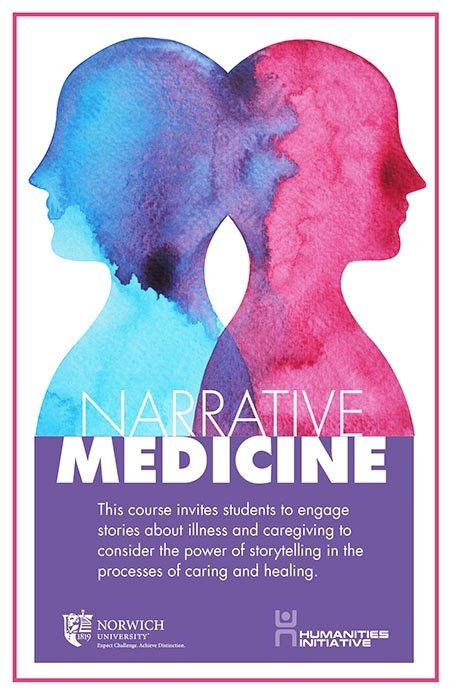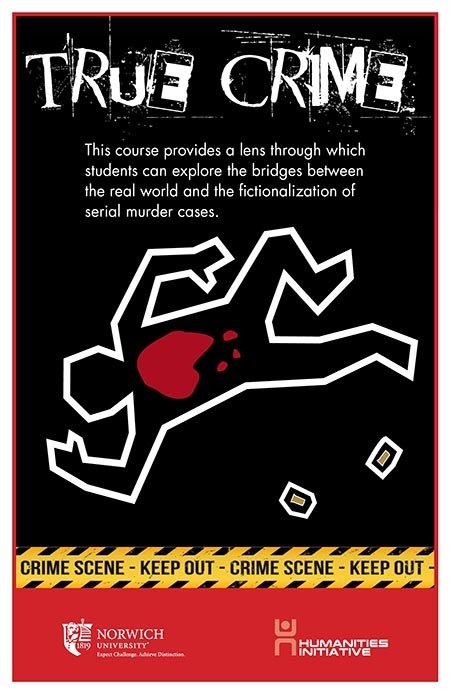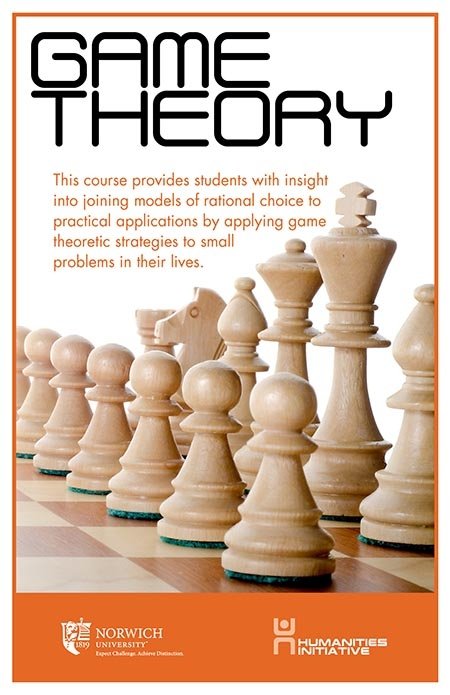The Norwich Humanities Initiative
The Norwich Humanities Initiative demonstrates the value and impact of integrating humanities-centered approaches to research, teaching, and learning within STEM and professional fields.
Our team-taught Topics in Interdisciplinary Humanities courses provide students with the tools they need to:
- Become storytellers
- Explore their histories
- Communicate efficiently and effectively with others
- Create
- Collaborate
- Ask questions
- Think outside the box
- Broaden their perspectives
- Engage the world they live in with fresh eyes and ears, and
- Become productive citizens of the world
Why is it important?
This initiative supports active student learning by providing opportunities for engagement with diverse perspectives and community involvement. Our humanities-centered approach to teaching and learning gives students the tools they need to become storytellers, to communicate more efficiently and effectively with others, to ask questions, to think outside the box, and to engage the world they live in with fresh eyes and an openness to new ideas. In a nutshell, this initiative seeks to enable students to succeed in life, work, and citizenship and foster the development of citizen scholars.
Our courses, events, and co-curricular activities will offer:
- Active learning (“learning by doing”)
- Collaboration
- Experiential learning
- Creative thinking
- Communication across disciplines
- Community engagement
- Presentation opportunities
- Life skills
Courses: Topics in Interdisciplinary Humanities
(Select image to enlarge)
Narrative Medicine

This course invites students to engage with stories about illness and caregiving to consider the power of storytelling in caring and healing. Through readings and exercises that involve firsthand experiences, we will address how stories work to convey human experiences, the nuances of bearing witness, and the capacity to empathetically and compassionately respond to illness. This course will benefit students in all majors grounded on the skills of listening and responding, including business, criminal justice, education, nursing, social work, and journalism.
Geoarchaeology of Lost Cities

Civilizations have come and gone and their physical and written record is limited, but knowable. Cities, harbors, and battlefields are major cultural features that fade into history, lost to conquest and destruction, burial, or erosion. In this course, we will employ written documentation and material remains along with climate and geological data to examine how scientists, historians and archaeologists work across an interdisciplinary format to answer old and develop new questions about past cultures. What happened at the Battle of Marathon and where is that battlefield today? Where is Memphis, the capital of Old Kingdom Egypt, and how was it rediscovered? Did climate change influence war and peace in the Han dynasty? How did the ancient Mayans develop vast agriculture under poor conditions? We will look into questions like these and more, using case studies and the interdisciplinary approach to knowledge.
True Crime

Murder has been a significant focus in both reality and myth, dating as far back as the Neanderthal era. True crime will provide a lens through which students can explore the bridges between the real world and the fictionalization of serial murder cases. Specifically, students will explore where fiction has taken extreme liberties, which can result in drastic misunderstandings of the criminal justice system. This course will provide students with the opportunity to explore not only serial murder as a crime, but also how artists, through appropriation, sensationalize these events for the fictional world.
Game Theory: The Art of Strategy

Game Theory is a tool for optimizing choices to produce strategic solutions to modern problems. The study of topics such as the prisoner’s dilemma, the paradox of the commons, and the stag hunt give students insight into joining models of rational choice to practical applications. Students will test theory with socioeconomic behavior experiments that simulate real-world scenarios using platforms such as VCWeb, MobLab, and GameWeb. Students will also apply game-theoretic strategies to small problems in their daily lives (book sharing, food and drink distribution, etc.) as a kind of life hack to help understand game theory's uses. These small lab and life applications will be developed throughout the course toward a larger, public-facing group or individual project that correlates with student career goals in business and leadership.
